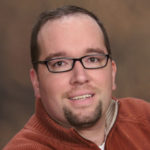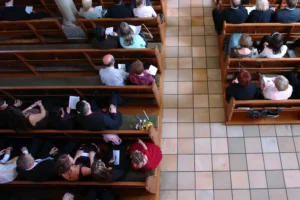You’ve said it, I’ve said it, and we’ve all read it more than once. It’s the popular line among born-and-bred evangelicals: “We never heard sermons on ______ growing up.” We often see this line employed after understanding a new spiritual truth or after the Spirit awakens in us a fresh empathy for injustice in our midst. Why didn’t the spiritual leaders we sat under for so many years — why didn’t they cover this important ground?
Our typical reaction is a bit of outrage and some self-righteous condemnation for those poor, unenlightened preachers who occupied our pulpits. But if we were honest, we’d realize that there are actually various reasons why certain topics didn’t get covered in Sunday sermons. It could be neglect, fear of man, or particular agendas that drove certain expositors away from valid topics. Or there might be less sinister explanations. Reasons you probably haven’t considered.
I’m a little more aware of the reasons behind these gaps. I recently finished five years as the senior pastor of a church in the northwest suburbs of Chicago. The experience of creating and fulfilling a preaching schedule gave me new insights into the difficulty of faithfully delivering spiritual food to God’s people. I’ve found four possible reasons why we didn’t hear what we wanted to hear from our childhood pastors:
1) There is not enough time for a pastor to cover every single topic thoroughly. W.A. Criswell, the iconic pastor of the famed 1st Baptist Church of Dallas committed to preaching through the entire Bible, from Genesis to Revelation. It took him almost 18 years. Now if you were a member of Criswell’s church from the very beginning of this series all the way through until the end and never missed a Sunday in 18 years, you might be able to say you heard every topic discussed.
And yet if Dr. Criswell were alive today, my guess is he’d say even his exhaustive coverage of the Bible didn’t completely plumb its depths. Paul reminds us that the revelation of God is deep and unsearchable and “past finding out” (Romans 11:33).
Most of us won’t have this experience. Whether the preaching style at our church is topical or expository, there is no way, even in five or 10 years, the pastor can address everything the Bible covers.
2) The pastor may have covered it, but you may not have been listening, or you may have been absent. I’ve found myself lamenting how few sermons on the Holy Spirit I heard growing up. I’m tempted to blame the conservative tradition in which I grew up and their views on the spiritual gifts. But if I were honest with myself, I have to ask, Even if there were sermons on the Holy Spirit, would I have been listening?
I attended Sunday morning and many Sunday night services since before I can remember. Partly due to maturity and partly due to spiritual laxity, I tuned out many of those sermons. Was this my pastor’s fault? Or was it my own? It could be that during this “tuning out” phase I missed the very types of sermons I feel were lacking. And what about the Sundays I was sick or on vacation? Maybe during those weeks he covered those topics I felt were absent. Maybe, maybe not, but we need to consider our own ability to listen and our presence before we accuse the spiritual leaders of our youth of neglect.
3) Given a limited window, perhaps the pastor only addressed topics that were relevant to that time and place. The questions culture asked 10 years ago are vastly different from the questions we ask today. The burdens unique to the church of our youth might be different from the burdens borne by Christians today. For instance, today, greater levels of immigration have changed our communities. We’re being confronted with varying ethnic groups, other religions, and new social patterns we didn’t grapple with 20 or 30 years ago. Faithful pastors preach the text of the Word of God, but they apply it in ways that are unique to the time and place in their local communities.
4) Our pastors are fallen human beings, prone to the same temptations that befall us. As a pastor, I know this struggle all too well. Though I committed myself to preaching all the way through difficult texts, I’ll admit there were topics I just didn’t like to cover. And this is the truth for every pastor. We approach the pulpit with our own set of biases, ecclesiastical traditions, and presuppositions. If we were honest, we’d say we fear the wrath of powerful influencers in the church and community more than we let on.
Every pastor in every church in America has gaps in his preaching. Areas where he could be stronger, but isn’t. Holes where necessary topics should be covered. Yet, somehow, God uses faithful men to lead and feed His church. Church bodies should hold pastors accountable for biblical preaching, but they should also give them grace and trust that the Word from God you hear on Sunday was the Word God intended for you to hear that day.
Conclusion
Pastor’s sermons are not meant to be the sole source of spiritual nurture. We put too much pressure on the Sunday morning sermon. To be sure, God uses preaching in a powerful and mysterious way to feed God’s people. And yet, we are also to be self-feeding, nurturing our own growth by prayer, our own personal Bible study, reading good books, counseling, and relationships with key friends. There are also small groups, Sunday school classes, catechism classes, conferences, Bible studies, and of course, formal theological education.
Just because a pastor didn’t cover an important topic during your time under his preaching, doesn’t mean he didn’t think it was valid or that you shouldn’t have known about it. It’s also our responsibility, as hearers, to pursue truth and cultivate a healthy life of the mind.
If we’re honest, we are often lazy with our spiritual lives. We should avoid the temptation to outsource the hard work of study to the professionals at church. We need to recommit ourselves to Holy Spirit-inspired effort to mine God’s Word ourselves. Here are some other ways we can self-feed:
Pray. Ask the Holy Spirit to direct you to the answers you need. Be specific about your need and ask Him to point you to good resources and spiritually mature mentors.
Ask your pastor or one of the pastoral staff. I’m sure the counseling and preaching staff of your church would be thrilled if you asked them, “What kind of answers can I find on this topic from the Scriptures?” He may show you right then, or he may point you to some good resources on the topic.
Do your own sleuthing. Study the Bible yourself. Get some good resources like trusted commentaries or theological works. Find a Christian organization you trust that is committed to biblical orthodoxy and has a reputation for balanced, thorough, biblical content. You might download a podcast on the subject, read a book, or check out a few blog posts.
Ask a trusted friend. Tell them you’d like to study up on the subject. It’s possible they know of a quality resource that can help in your spiritual growth.
Consider a conference. There are hundreds of Christian conferences on a variety of important issues, including Boundless’ very own Pursuit 2014. If money is tight, perhaps you could find one close to your town or find archives of some of the teaching sessions.
So perhaps it’s time to retire our outrage over sermons we wish we heard growing up. Instead, let’s treat fresh insights as gifts from God rather than cudgels with which to beat up our childhood pastors. Yes, there are probably some things you didn’t hear in your church growing up, but as an adult, it may be time to move past blaming our childhood churches and seek out answers from God’s Word.
Copyright 2014 Daniel Darling. All rights reserved.












